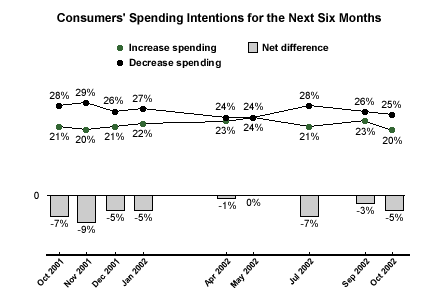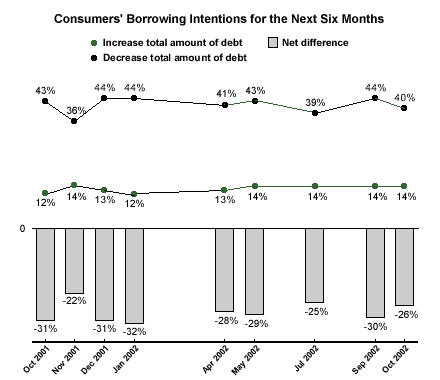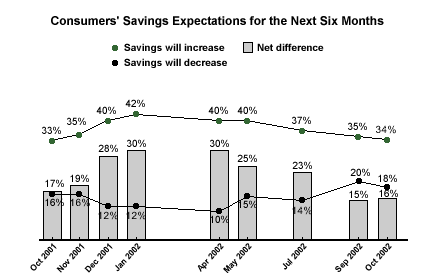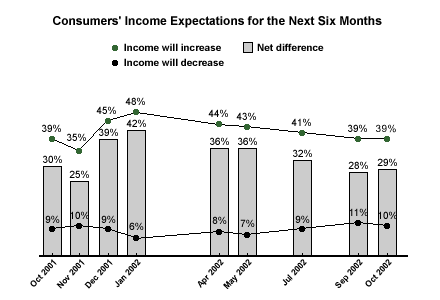Profits at many big companies beat Wall Street's expectations last week sending the stock market higher for the second week in a row. The increase of more than 1,000 points in the Dow from its low point has some traders talking about a new bull market. Even more importantly, some economic prognosticators are suggesting that the sharp upturn in the stock market might lead to rising consumer and business confidence in the months ahead. If this might be the case, then the nation's retailers have to hope that the stock market continues to rally strongly during the weeks ahead. Because given their current mood, consumers will be spending less this holiday season than they did last year.
Consumers Plan to Spend Less
A decrease in consumer holiday spending plans would be fully consistent with what consumers said about their overall spending plans over the next six months. According to a new Gallup Poll conducted Oct. 14-17, more consumers (25%) said they plan to decrease their level of spending over the next six months than said they plan to increase it (20%). Last October, the situation was just about the same, with 28% of consumers saying they planned to spend less and only 21% saying they planned to spend more. This difference shrank during the first half of 2002 -- in April and May 24% of consumers each said they planned to spend more in the next six months, and an equal percentage said they planned to spend less. Since July, however, more consumers have said they plan to spend less than said they plan to spend more.

More Consumers Also Plan to Borrow Less . . .
More consumers also currently plan to borrow less than plan to borrow more. In October, 40% of consumers said they plan to borrow less over the next six months while only 14% plan to borrow more. These percentages are little changed since last October, when 43% of consumers told Gallup they planned to borrow less and 12% said they planned to borrow more. So this situation has not deteriorated in recent months, but neither has it improved, which isn't good news for consumer spending.

. . . And Save More
Conversely, more consumers currently plan to save more than save less. Thirty-four percent of consumers say they plan to save more over the next six months, while only 18% plan to save less. These percentages have also been fairly consistent this year.

Still, More Consumers Expect Their Incomes to Increase
But while the number of consumers planning to spend less and borrow less over the next six months is on the rise, so is the number who expect to see their incomes increase over the same period. In the October survey, 39% of consumers said they expect their incomes to increase over the next six months, while only 10% said they expect their incomes to decrease. While the percentage expecting income increases is down from 48% in January, it is still relatively high, particularly given the current condition of the economy.

Key Points
The current consumer mood suggests that retailers should plan on a weaker holiday selling season this year. Right now, consumers' attitudes toward spending overall, and holiday spending in particular, are not looking good. And, there aren't many signs that their outlook will change for the better anytime soon.
Of course, there is always reason for hope. Perhaps the stock market will continue to increase in the weeks or months ahead and the impact of the negative wealth effect resulting from recent equity losses will be mitigated. Or maybe the Fed will lower interest rates next month, encouraging consumers. Maybe Congress will return after the elections and take meaningful actions to stimulate investor and consumer confidence. Maybe a war with Iraq will be averted and oil prices will plunge.
Still, I don't think retailers should bet on these or other "maybes." Instead, they should plan for a weak holiday season. And, while we all hope the economy avoids a double-digit recession in the months ahead, the chances are now high enough that hedging against the possibility is only prudent.
*Results are based on telephone interviews with 1,002 national adults, aged 18 and older, conducted Oct. 14-17, 2002. For results based on the total sample of national adults, one can say with 95% confidence that the maximum margin of sampling error is ±3%.

